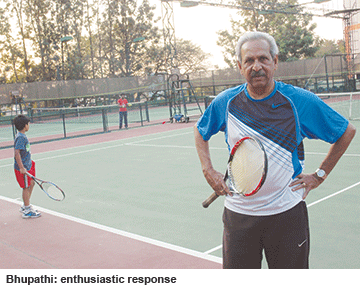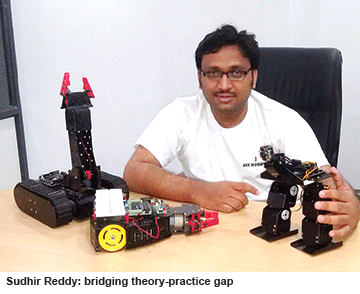 FORMER INDIA tennis player and coach of many Davis Cup stars, and co-founder of Bangalore’s top-ranked The Magical Years (TMY) preschool, Krishna Bhupathi is all set to launch The Village School (TVS), a primary-secondary which in the fullness of time will roll out into a fully-fledged Cambridge International Examinations (CIE), UK-affiliated class I-XII co-ed day school.
FORMER INDIA tennis player and coach of many Davis Cup stars, and co-founder of Bangalore’s top-ranked The Magical Years (TMY) preschool, Krishna Bhupathi is all set to launch The Village School (TVS), a primary-secondary which in the fullness of time will roll out into a fully-fledged Cambridge International Examinations (CIE), UK-affiliated class I-XII co-ed day school.
Newspeg. TVS, which shares a two-acre campus in Kodigehalli, Bangalore with the Bhupathi Tennis Village and its feeder preschool TMY, is ready to admit its first batch of class I and II students in June. Admission interviews are on in full swing with 50 students expected to enroll for the academic year 2014-15.
History. In 1995, Bhupathi forayed into sports education by launching the Nike Bhupathi Tennis Village, which transformed into Bhupathi Tennis Village after its collaboration with the US-based sports equipment, shoes and apparel major Nike ended in 2009. After revolutionising tennis coaching in India, Bhupathi ventured into academics in 2011 with the promotion of The Magical Years, a preschool for children in the age group two-six years in partnership with The Magic Years, Delhi’s consistently top-ranked preschool founded by Shirley Madhavan Kutty. In the EW India Preschool Rankings 2013, TMY was ranked #5 in Bangalore and #1 on the parameter of infrastructure provision.
TVS is equipped with six tennis courts which double as multipurpose areas to teach basketball, football, hockey and cricket. Moreover, students are served by a fully-equipped gym and swimming pool.
Direct talk. “In The Village School, we will continue the TMY tradition of offering excellent academics with high-quality sports education. Students will receive structured physical training and those exhibiting aptitude and promise in a particular sport will be trained by professionals under a special programme integrated with the academic time-table. Our aim is to offer holistic education with special focus on early and sustained sports training,” says Bhupathi.
USP. To assuage fears of prospective parents about the academic curriculum of TVS, Bhupathi has roped in the expertise of Kiran Sethi, the celebrated promoter-chairperson of The Riverside School, Ahmedabad — ranked #3 all-India and #1 co-ed day school in Gujarat in the EW India School Rankings 2013. Under a collaboration agreement, Riverside will share its K-12 curriculum, pedagogies, processes and practices with TVS.
Future plans. With the garden city’s informed public well aware of Bhupathi’s successful transformation of the Bhupathi Tennis Village into a nursery of champions, and Magical Years into a top-ranked preschool, the response to TVS’ admission drive has been enthusiastic. “We are receiving overwhelming response from parents for admission into our inaugural classes I-II. Subsequently we will be adding one class every year until class XII. With our affiliation application pending with the CIE, I’m confident that TVS will evolve into a unique institution committed to imparting high-quality academic education combined with globally comparable sports training,” says Bhupathi.
Summiya Yasmeen (Bangalore)
Tree House rollout
Rajesh Bhatia is the founder-managing director of Tree House Education & Accessories Ltd (estb. 2006), and promoter of one of India’s largest self-operated preschool chains with 444 (including 340 company-owned) centres. The publicly listed company employs 1,848 staff including 1,758 teachers in 55 cities and towns countrywide, and recorded a revenue of Rs.121 crore in 2012-13..gif)
Newspeg. Last June, Tree House launched Global Champs, an initiative for affordable, high quality English-medium pre-primary education to children in the 1.5-6 years age group, catering to the low-income and slum areas of suburban Mumbai with annual fees of Rs.10,000-12,000 per child. Three Global Champs preschools have already been established in the suburbs of Chembur, Malad and Kandivali, with the fourth recently launched in Dharavi — Asia’s largest slum cluster. Meanwhile, Tree House has also completed a Rs.5 crore acquisition of the Brainworks brand from Brainworks Learning Systems, a chain with 64 preschools across India.
History. An engineering graduate of MS University, Baroda with an MBA from Pune University, Bhatia began his professional career in 20th Century Finance prior to promoting the first Tree House preschool in 2003 in Mumbai. As a young parent he became aware of the severe shortage of affordable preschools in the country’s commercial capital which prompted his first academic initiative. In 2008, Tree House attracted its first round of private equity funding of $7 million (Rs.42 crore) from Matrix Partners India. Since then, this ECCE (early childhood care and education) company has recorded a scorching pace of growth to emerge as a nationally recognised heavyweight in preschool education.
Direct talk. “With the acquisition of Brainworks and launch of our Global Champs brand of preschools, we have realised our objective of offering high quality pre-primary education to children from all segments of society. Now our standard preschools are grouped and marketed under the Tree House brand; franchised preschools under the Brainworks brand and self-operated Global Champs preschools target children from low-income households. This ensures a complete 360 degree coverage of every section of society,” says Bhatia.
Future plans. “Our focus will be on well-structured curriculums, qualified teachers and strict adherence to quality wherever we go,” enthuses Bhatia. With Tree House having achieved its objective of offering high quality preschools to all segments of society, Bhatia is set to impact the company’s footprint nationwide. “Although infrastructure and facilities of Tree House, Brainworks and Global Champs schools will vary, the common thread binding all our preschools will be high quality curriculums, well-qualified teachers and quality content. This will ensure the success of all our brands,” says Bhatia.
Sunayana Nair (Mumbai)
Rose cutting
Pinaki Ganguly is the incumbent secretary of Sri Sri Ramkrishna Vivekananda Vidyapith, a new K-II school established by the Rural Organisation for Social Establishment (ROSE) in Charida, a tiny village (pop. 2,500) in West Bengal’s most backward Purulia district. The school with an enrollment of 77 students (45 boys and 32 girls) instructed by four teachers, is the first academic initiative of ROSE.
 Promoted by Ganguly and 11 other local members in 2002, ROSE is an NGO working for community development in this tribals-dominated district. Hitherto it had been providing an ambulance service, facilitating Unicef’s total sanitation campaign, and spreading socially positive messages on education, health, and early marriage through chau and jhumur — traditional folk dances of Purulia. The NGO is primarily funded by local government organisations including zilla and gram panchayats and the panchayat samiti. Touch Mission, a Mumbai-based NGO provides education material to 200 underprivileged children identified and supported by ROSE.
Promoted by Ganguly and 11 other local members in 2002, ROSE is an NGO working for community development in this tribals-dominated district. Hitherto it had been providing an ambulance service, facilitating Unicef’s total sanitation campaign, and spreading socially positive messages on education, health, and early marriage through chau and jhumur — traditional folk dances of Purulia. The NGO is primarily funded by local government organisations including zilla and gram panchayats and the panchayat samiti. Touch Mission, a Mumbai-based NGO provides education material to 200 underprivileged children identified and supported by ROSE.
Newspeg. In the academic year beginning January the school began class II in a new one-storeyed building allocated by the state government in the contiguous village of Kanrihensa.
History. As indicated in its name, the vidyapith (school) has been inspired by the teachings of educator-philosophers Swami Vivekananda and Sri Ramkrishna who preached the message of holistic learning “so that learning becomes entertaining to the blooming buds of the village”. However, to part-subsidise the cost of education provision and “also to impact the value of quality education,” a tuition fee of Rs.75 per month is levied on parents who also have to pay a one-time admission fee of Rs.300. But the costs of school uniforms, winter garments and school bags, exercise and text books, are all included in these fees.
Direct talk.“Because government schools don’t levy any tuition fee, they are unable to provide quality education. Therefore people in Charida and its neighbourhood are ready to make great financial sacrifices to send children to our school. Nevertheless to 15 students from extremely poor households, we offer full scholarships,” says Ganguly. “To retain children in school, we take great pains to make learning interesting and entertaining by celebrating cultural festivals, encouraging sports education and taking children on excursions to heritage sites to enable them to appreciate our culture and traditions,” he adds.
Future plans. Although the principles and values of holistic education are well-known in urban India, they are novel to the community in this remote district of West Bengal. Therefore the ROSE-promoted vidyapith has aroused great enthusiasm within the region’s parent and student communities. “We are now working to provide vocational education, particularly in computer skills to our students. Once parents witness learning outcomes in their children, they will become champions of education,” says Ganguly.
Baishali Mukherjee (Kolkata)
Robotics evangelist
Sudhir Reddy is managing director of the Hyderabad-based Jay Robotix Pvt. Ltd, a company engaged in manufacturing customised robots for the defence services and Indian industry.
Newspeg. Jay Robotix is all set to launch Robox, an experiential STEM (science, technology, engineering and mathematics) learning package mapped with the curriculums of major exam boards, to enable learning of science and maths through robotics. Although Robox is its latest integrated offering for class VI-XII school students, over 2,500 students in 90 schools in Andhra Pradesh and 11,000 students in engineering colleges across the state have subscribed to, and are enriching their STEM subjects education by following Jay Robotix compact disc learning modules.
Moreover, the company has established its Robolabs in two Hyderabad-based engineering colleges and one in Indore. And in June this year, Jay Robotix will roll out version 2.0 of ROBOKID-2014, a national competition based on the theme of environmental awareness for class VI-X school children. Teams from over 250 schools across the country are expected to participate in the event.
History. An alumnus of SASTRA University, Tamil Nadu, with a Masters in mechatronics from Florida University, Reddy closely studied the robotics-driven productivity revolution while studying in the US. Therefore on his return to India in March 2010, he promoted Jay Robotix to manufacture task-specific industrial robots, before venturing into education in 2011.
Direct talk. “On my return from the US, I felt that in school and higher education, there is need for a process or pedagogy which facilitates conceptual understanding of textbook theory through engaging experiential learning. Our objective of venturing into education is to bridge this gap between theory and practice and facilitate a thorough understanding of STEM concepts through robotics education,” says Reddy.
Future plans. Having established an excellent reputation in Indian industry and academia within less than four years, Jay Robotix is looking for investor-partners to diversify and roll out its education packages. “Indian children have an inherited science and maths learning tradition. Unfortunately, this has been suppressed by boring, textbooks-based learning. By providing enjoyable experiential learning opportunities to supplement classroom learning through robotics, this tradition can be revived. That’s our objective,” says Reddy.
Aruna Ravikumar (Hyderabad)